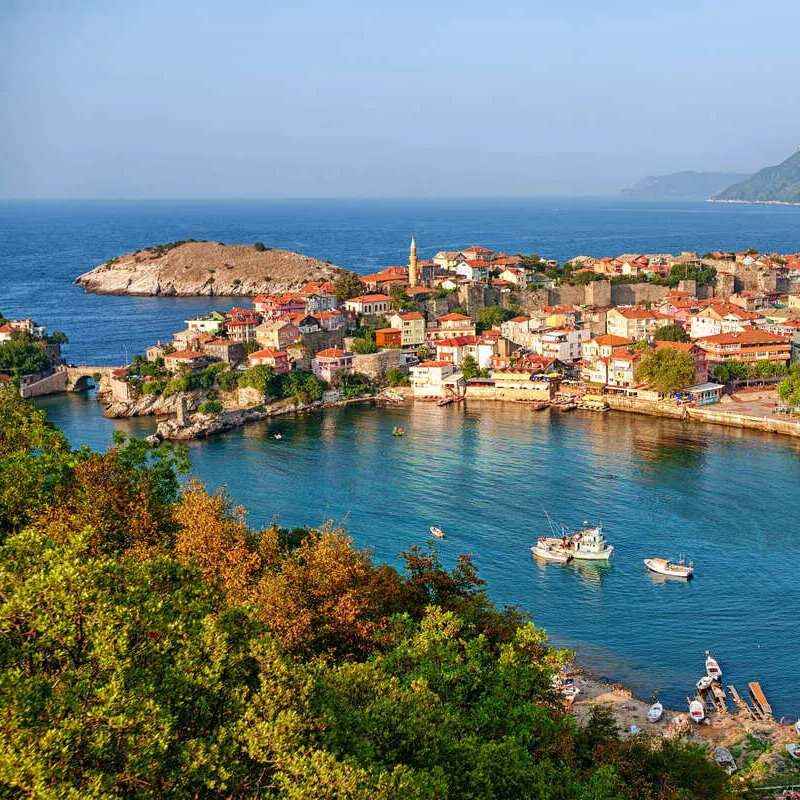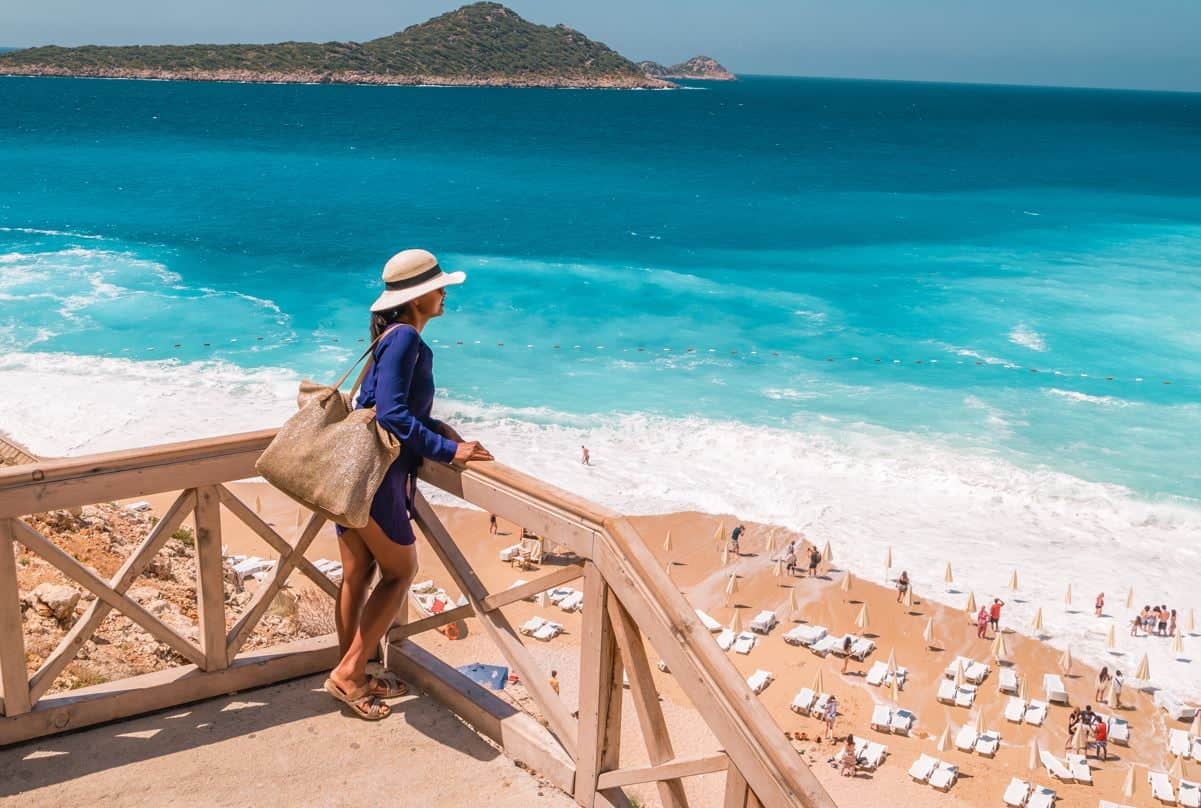The Mediterranean – commonly called the Med – has become America’s go-to summer vacation.
Now that border curbs have been axed and normality has been reinstated across the pond, U.S. citizens are flocking to the ancient sea’s shores for some of that laid-back, dolce vita.
Other than the traditional hotspots of France and Spain, it’s an Eastern country that’s been stealing the spotlight following Europe’s wider reopening, currently ranking as the fourth-most popular destination in the world.
Turkey – officially called Türkiye – is now the trendiest country in the Mediterranean, having hosted 50.5 million visitors last year. If you’re wondering how it’s got so popular and why everyone is obsessed with it, we’ll gladly give you 5 reasons why:
The City of the World’s Desire
Türkiye is home to the cross-continental behemoth that is Istanbul, and that alone is reason enough for you to add it to your bucket list this summer.
A city straddling two continents, so vast it stretches from the Southeastern-most tip of Europe, spans the Bosphorus Strait and reaches Asia’s westernmost peninsula of Anatolia, it is an ancient queen shrouded in myth, that’s fascinated aspiring emperors, passionate travelers, and avid Historians for at least two millennia.

Formerly called Constantinople, Istanbul was born a Roman city and remained at the heart of the Eastern Roman – or Byzantine Empire – from its founding days until it was overtaken by Ottoman forces in the 15th century.
At the crossroads of the Western and Eastern Worlds, it is an open-air museum where landmarks from each of its eras can still be appreciated, from the 6th-century Byzantine cathedral-turned-mosque Hagia Sophia to the magnificent Suleymaniye Mosque, an Ottoman imperial gem.
Besides its fascinating History, modern-day Istanbul is a vibrant metropolis with an unparalleled social scene.

Full of lively bazaars, quirky cafes, upscale shopping districts, and rooftop bars commanding impressive views of the minaret-dotted skyline, it will take your breath away like it did ours.
Diverse Offer
Istanbul may be Türkiye’s leading tourist destination – by an inch – but it is not representative of the country as a whole. As you are about to learn, this is one of Eurasia’s most impossibly diverse and multicultural states.
There is something in Türkiye for every traveler profile. If you’re a hiker and nature enthusiast, the snow-capped, dramatic peaks of Eastern Türkiye, a lesser-known province close to the borders of Georgia and Armenia, will offer you the sweeping panoramas you so desperately crave.

They say Turkish nature is a force to be reckoned with, and we certainly don’t doubt that. As if the majestic Eastern mountain ranges aren’t enough proof, there is always other-worldly Cappadocia to further back this claim.
An arid landscape with unique geological formations, where fairy chimneys rise up to the balloon-specked skies, and cities are carved into hard rock, or built underground, places like Goreme are your best bet at experiencing indigenous Anatolian culture, where globalization is yet to swallow it whole.
If it’s unspoiled beach stretches you’re after, the Black Sea region is lined with ancient cities and charming fishing villages, bounded by unruffled golden sands and the azure waters of the New Mediterranean.

On the other hand, if it’s coastal giants with a well-developed luxury resort scene that makes your heart flutter, the gorgeous Aegean Coast, a stone’s throw away from numerous Greek islands, will give you that much-needed subtropical vibe. Think: Izmir, Bodrum, Kusadasi.
Make sure you don’t miss Pamukkale: translated from Turkish as ‘cotton castle’, a natural site formed by cooled, dissolved calcium that cascaded over a cliff-edge, leaving behind hardened deposits where thermal spring waters now pool in.
Beautiful Coastline
We’ve touched on that briefly already, but we truly struggle to find words to describe the boundless beauty of the Turkish coastline.

It extends from the enclosed Black Sea down to the Sea of Marmara, which separates Europe from Asia, and finally, the Aegean and Eastern Mediterranean coasts.
Traveling down Türkiye’s underappreciated ocean drive, you will be rewarded with views of spotless white-sand beaches, where the sea is of the clearest of blues, small towns with origins lost to time, inhabited by locals who are proud of their centuries-old traditions, and lush marine parks.
Three of the most beautiful beach destinations in the country include Trabzon, an off-path Black Sea tourists skip altogether as it is not a Mediterranean hub, though it is just as hot and summery; Fethiye, a small city in the Mugla Province, famous for being the gateway to the Turkish Riviera, and Antalya, Türkiye’s number-one Mediterranean resort.

Greco-Roman Heritage
Looking beyond the most obvious tourist offer, namely the Mediterranean beaches and world-class city breaks, Türkiye is just as sought-after for its rich Greco-Roman heritage. It is, after all, a Mediterranean nation whose History is closely intertwined with that of other European powers.
In Ancient Times, much of the Turkish coast was, in fact, Greek, with some of the most emblematic cities in Hellenic mythology now lying in ruins on the other side of the border.
To name a few, we have Ephesus, where the renowned Library of Celsus is located; the legendary Troy, the site of the debated Trojan War; and Perge, once an important Eastern Mediterranean port; and many more.

Did you know, for instance, that Homer might have been born in or near Smyrna (modern-day Izmir) in Türkiye? Except, back then, the Turkish state did not exist, and much of the Anatolian Peninsula belonged to the wider Hellenic World.
Or that one of the best-preserved Roman theaters, with an intact Scaenae frons, is still standing is found in Aspendos, near Antalya? Don’t get us started on the now-disassembled Temple of Artemis, close to Ephesus, one of the Seven Wonders of the Ancient World, and an awe-inspiring relic of the bygone Ancient Hellenic civilization.

Sadly, only a single free-standing column remains.
To my fellow History buffs out there, you will never run out of archaeological zones and amazing points of interest to explore in Türkiye. Trust me, I have been to the country six times, and with each visit, the list keeps growing.
It Can Be Much Cheaper
Finally, one of the main reasons why Türkiye is soaring in popularity among travelers is its affordability.

Despite the soaring inflation that’s been plaguing the Turkish economy over the unorthodox monetary policies of the incumbent President and the fluctuating value of the lira, it is still a shockingly cheap vacation for most Westerners earning in dollars or euros.
Now that the lira has hit a new historic low, trading at TRY 26.06 against US$1, tourist dollars are stretching a lot further here than in, say, Greece or other neighboring Euroized economies.
As its largest city and financial center, Istanbul is easily Türkiye’s most expensive place to live, and even then, Americans’ purchasing power tends to be 68.8% higher than in New York, one of the costliest cities on the Eastern U.S. coast.

Though tourist prices are generally higher, as holiday accommodation in Türkiye is not as cheap as long-term rentals, there are some pretty sweet deals floating around, from mid-range hotels (breakfast included) evaluated at US $51 per night to much-cheaper shared rooms in hostels from only US $15 in Antalya.
Accommodation aside, food in Türkiye is remarkably cheap, other than being delicious.
Ordering a hearty meal at an inexpensive restaurant, generally including a soup for starters and a kebab meal, will cost you on average US$5.76, while three-course dinners at higher-end spots should set you back by a moderate US$28.78.

Overall, a single person’s monthly expenses in Istanbul are estimated to be about US$500 without rent. This applies mostly to locals, as tourist expenditure is a lot higher, but it may help you budget accordingly if you’re not the splurging type.
There is a Türkiye for every budget, and that’s one of the many reasons why more and more Americans feel drawn to it.

